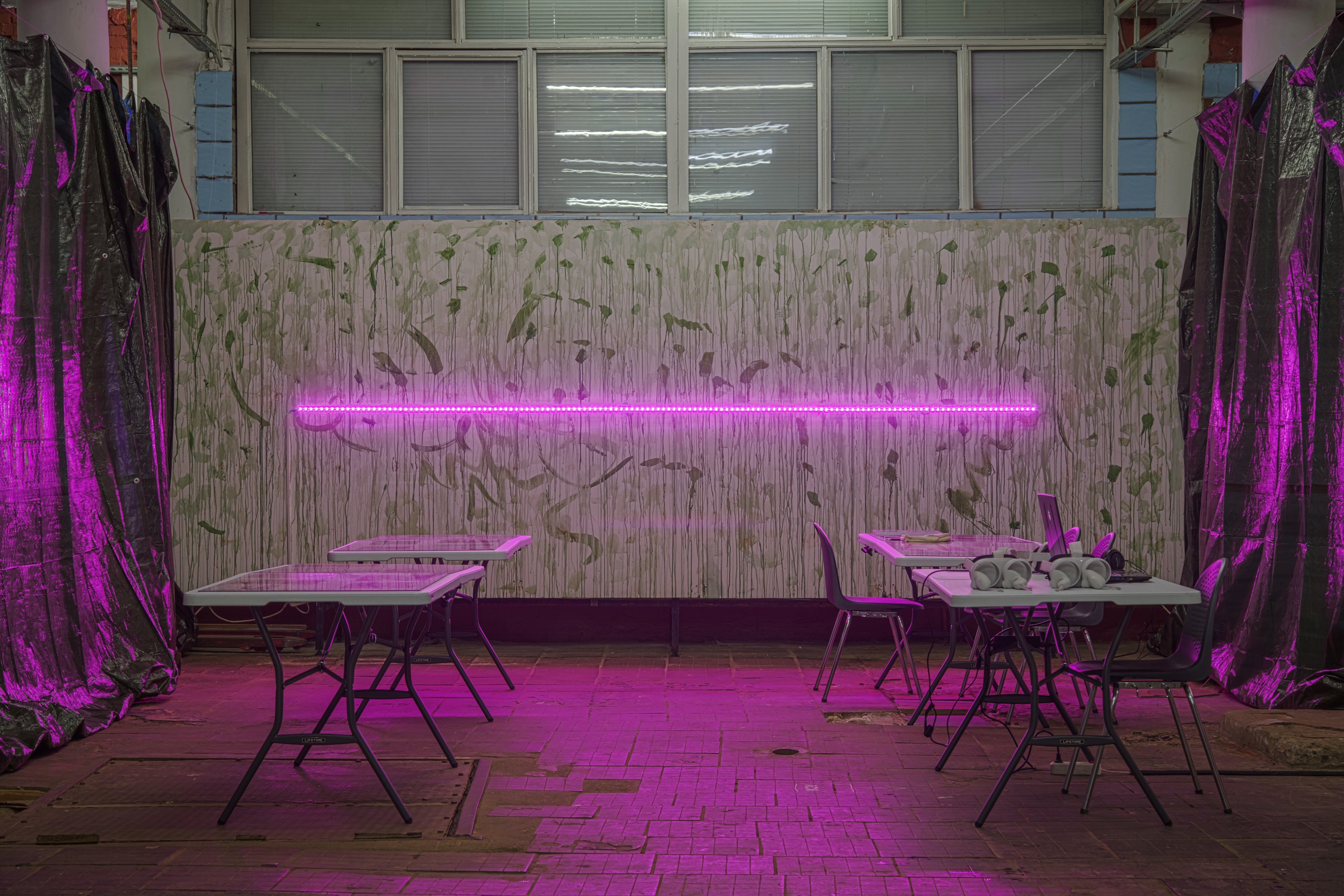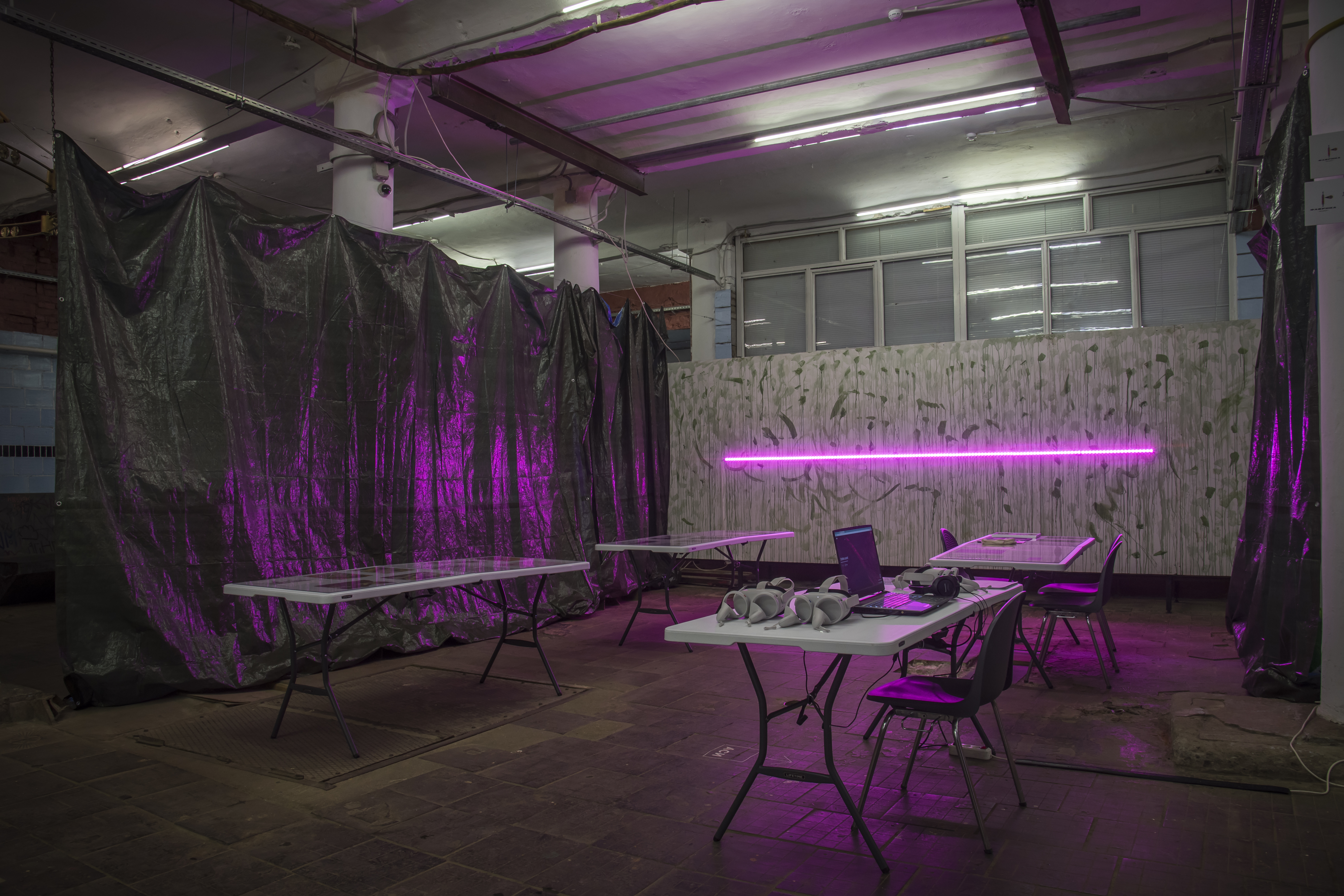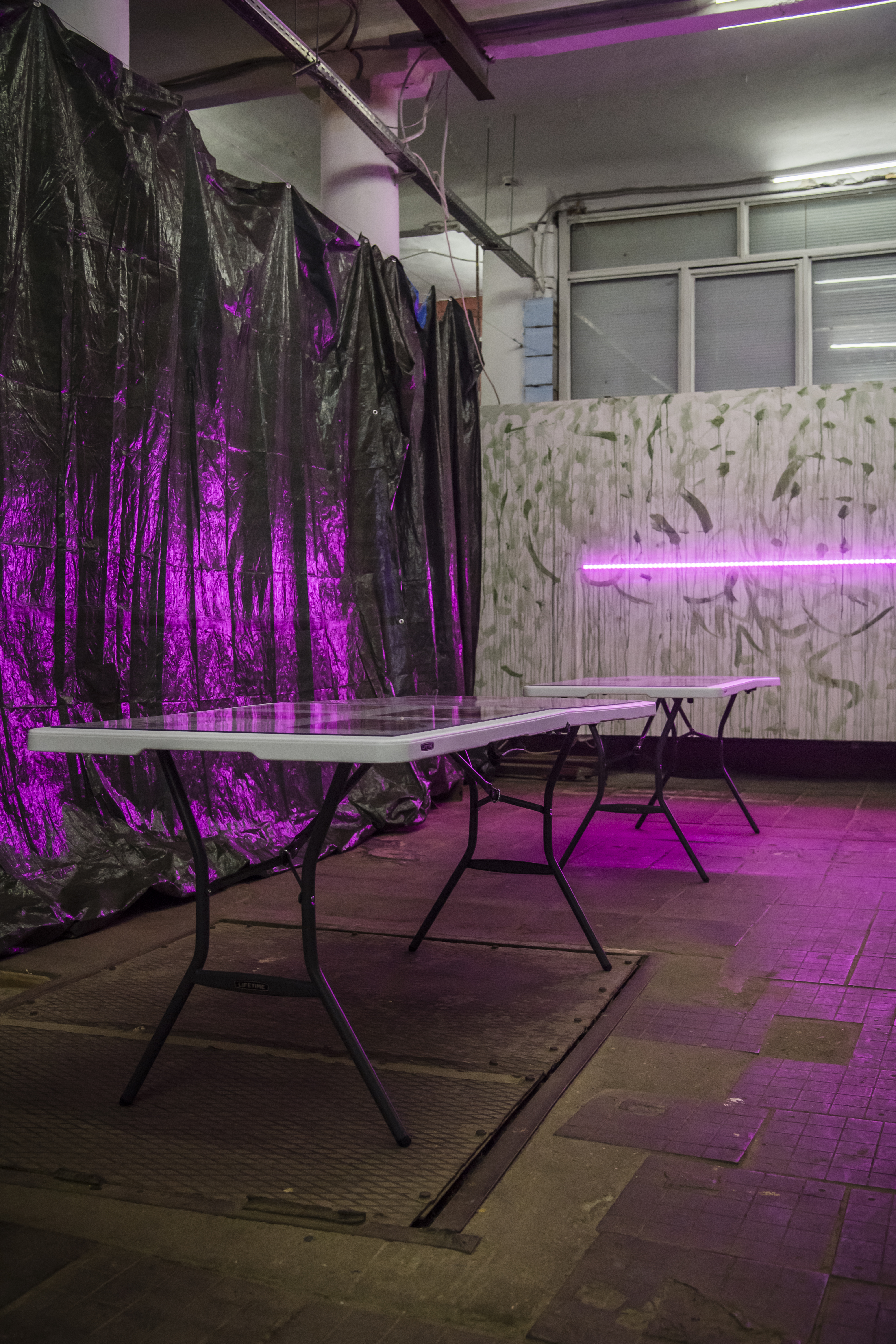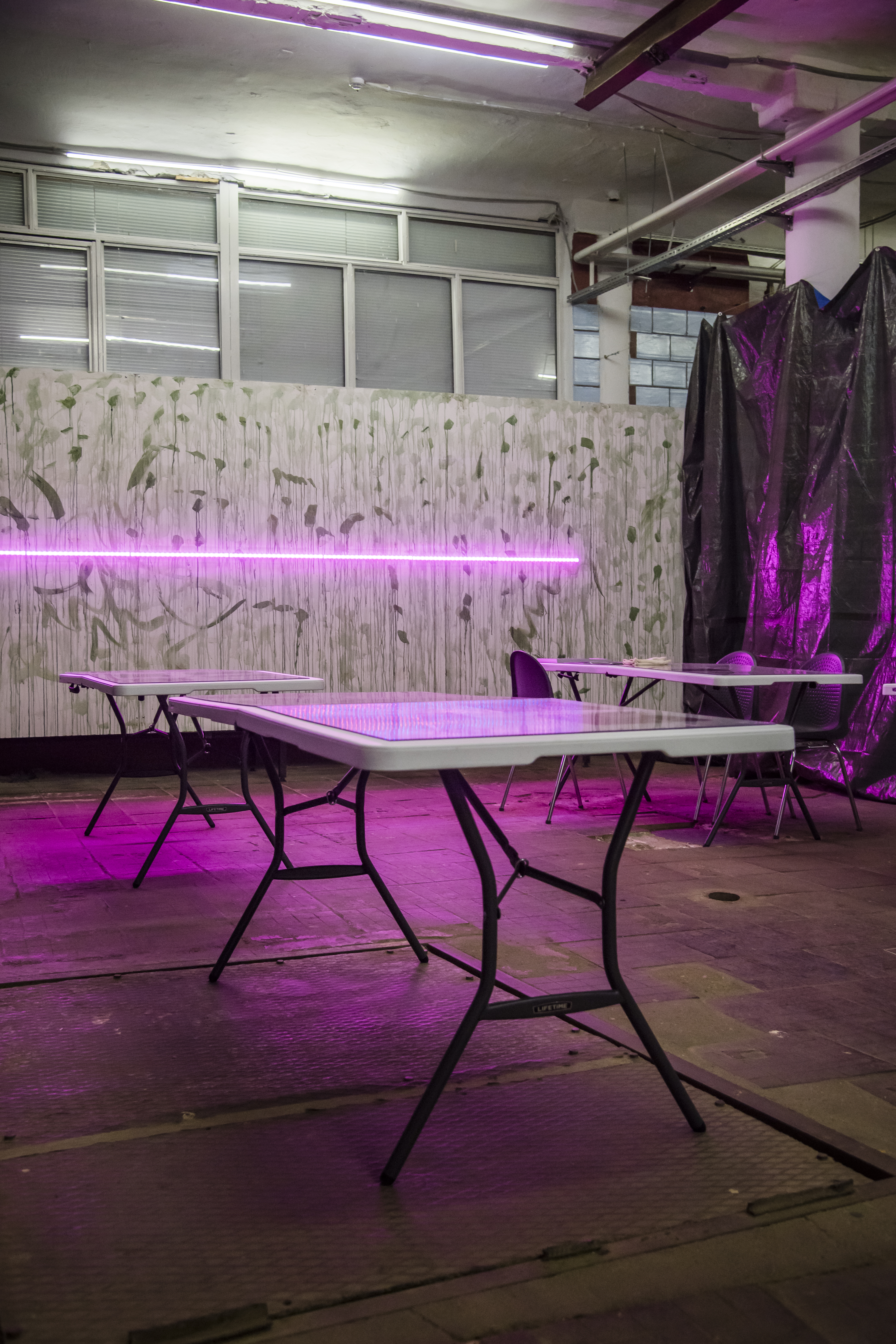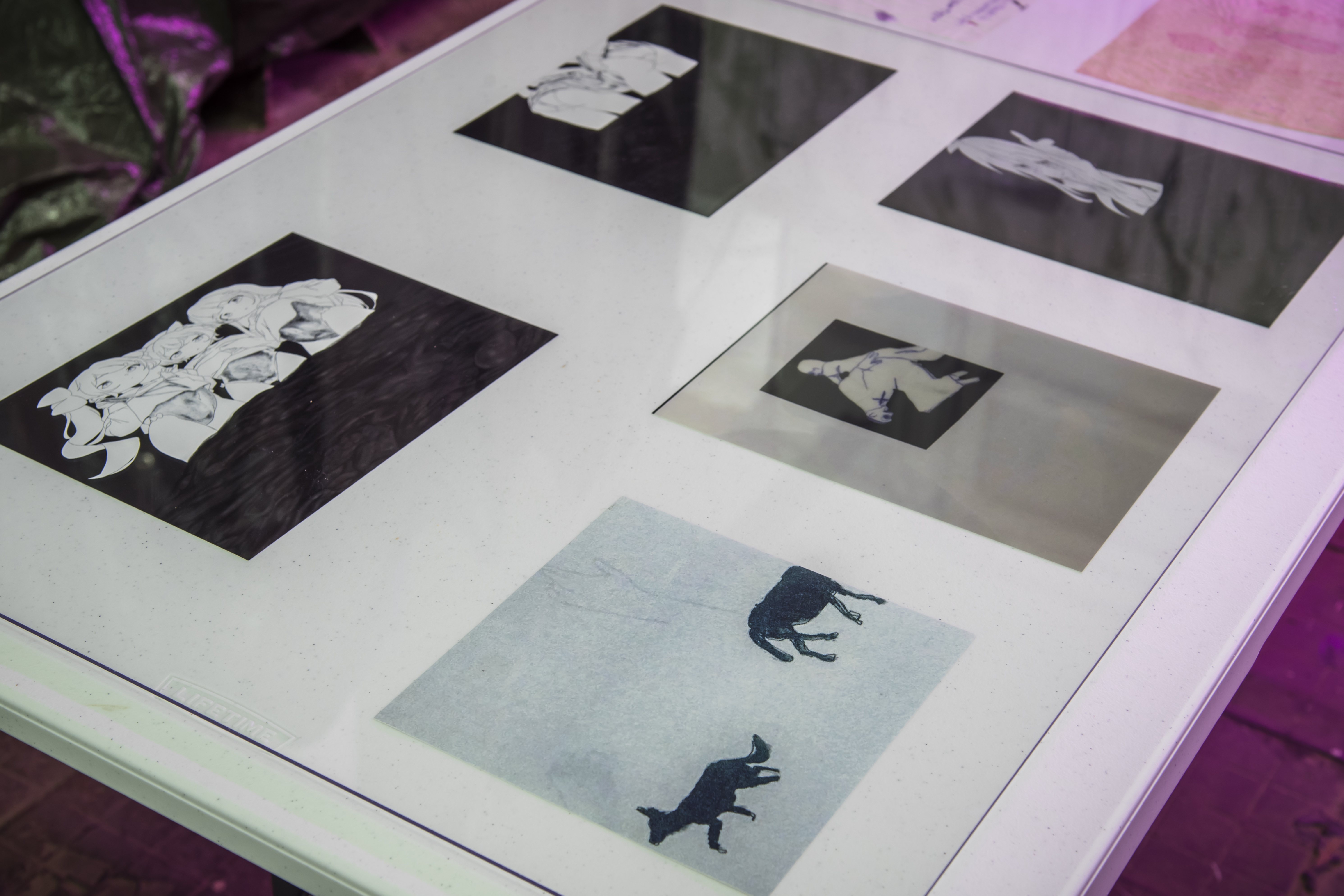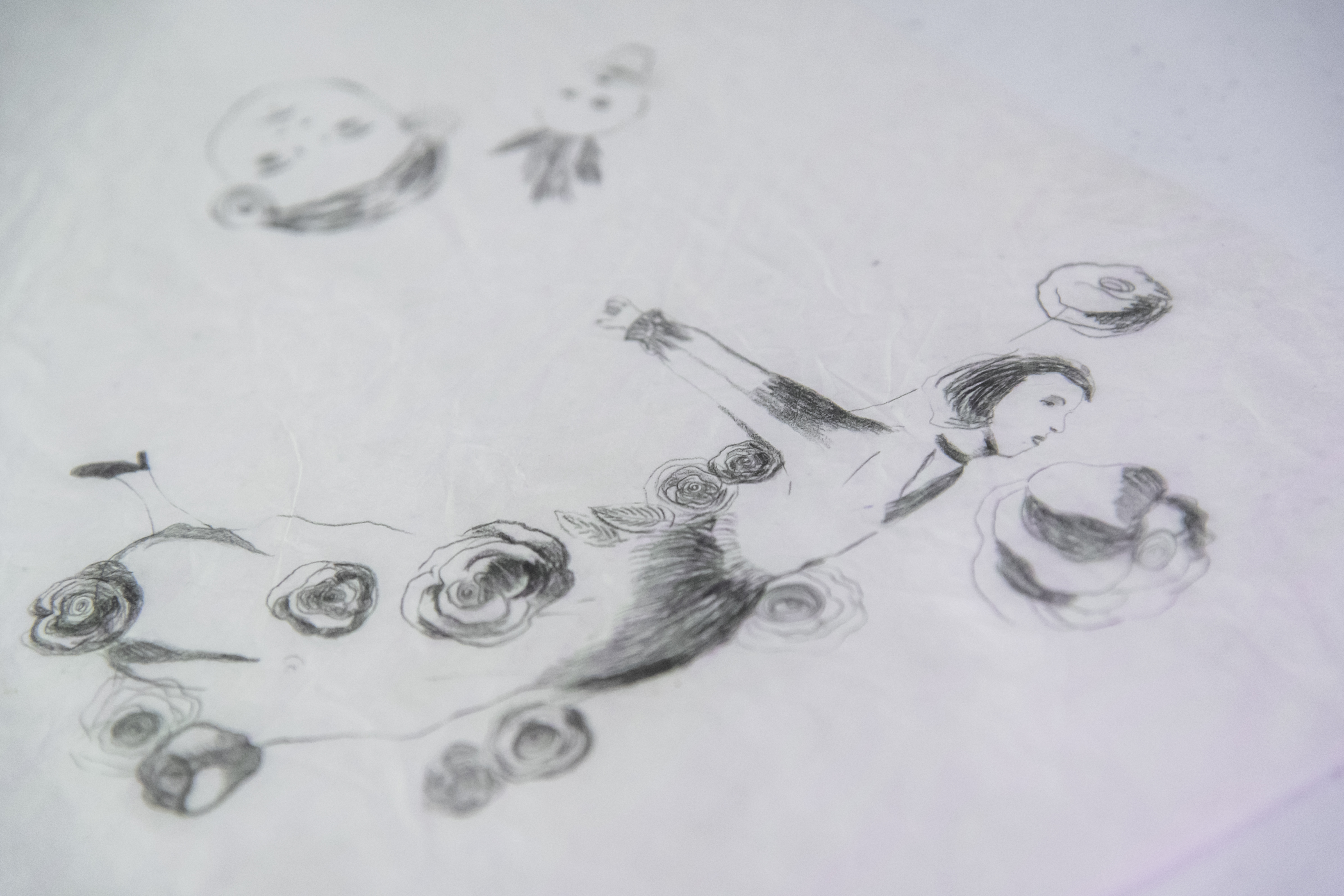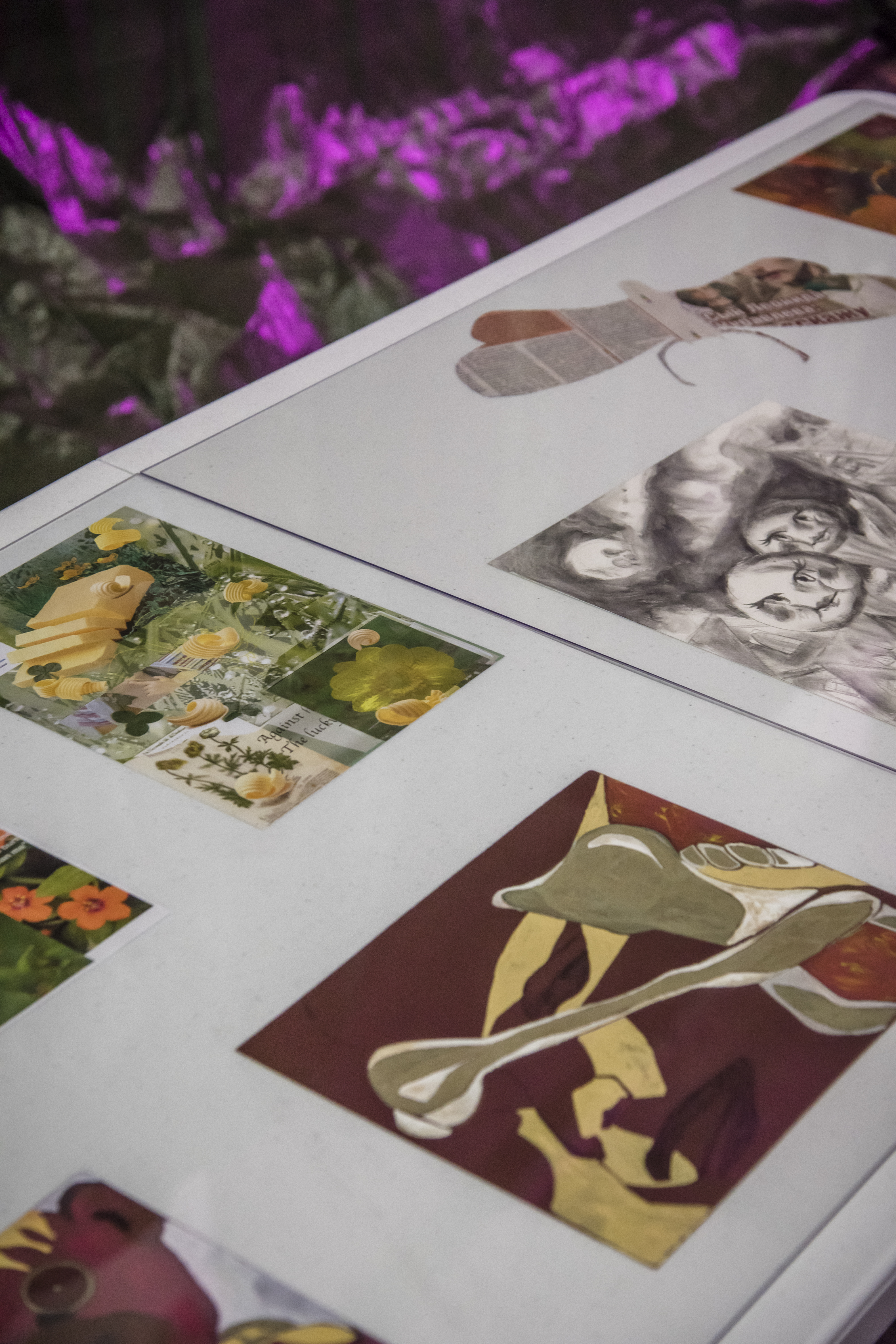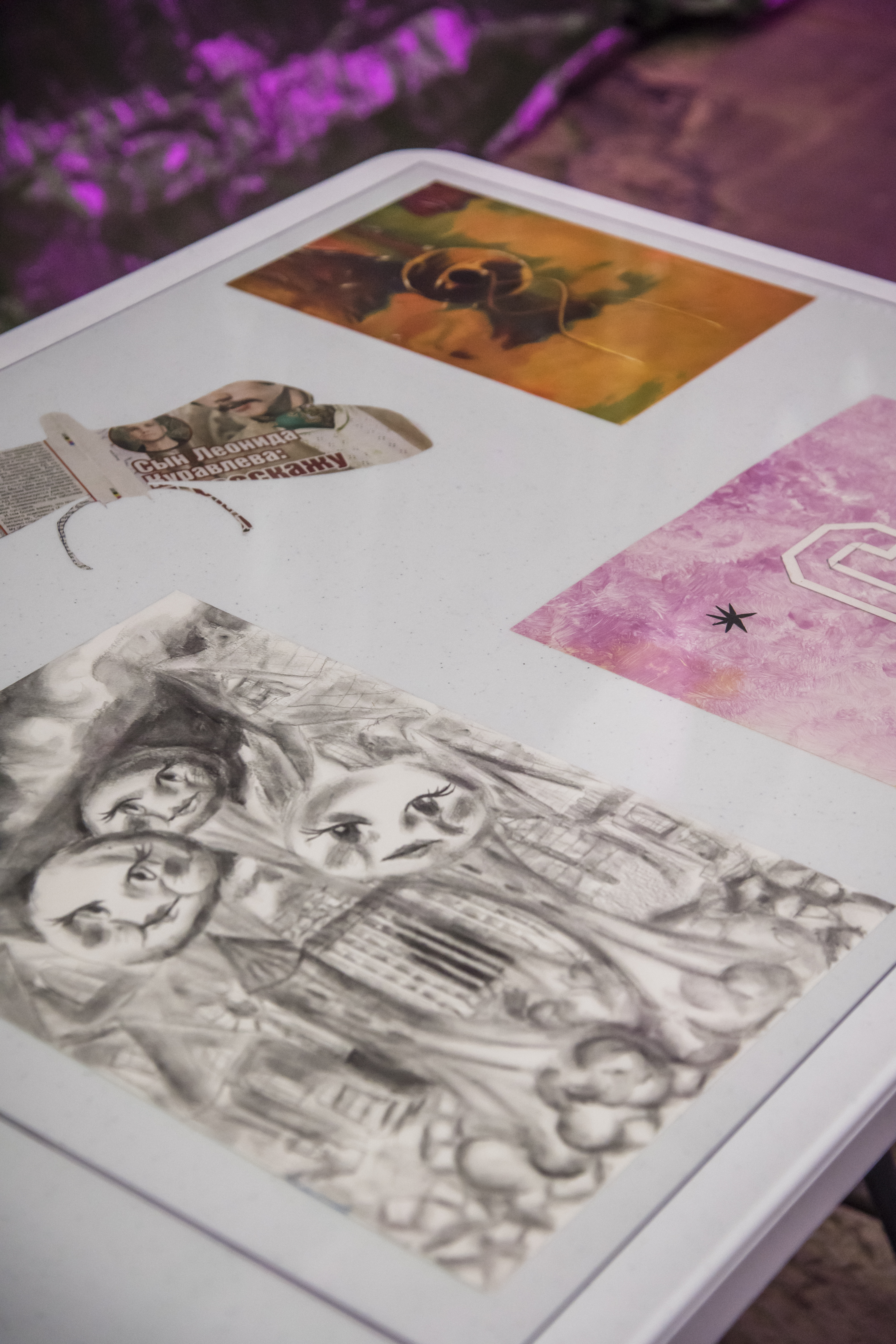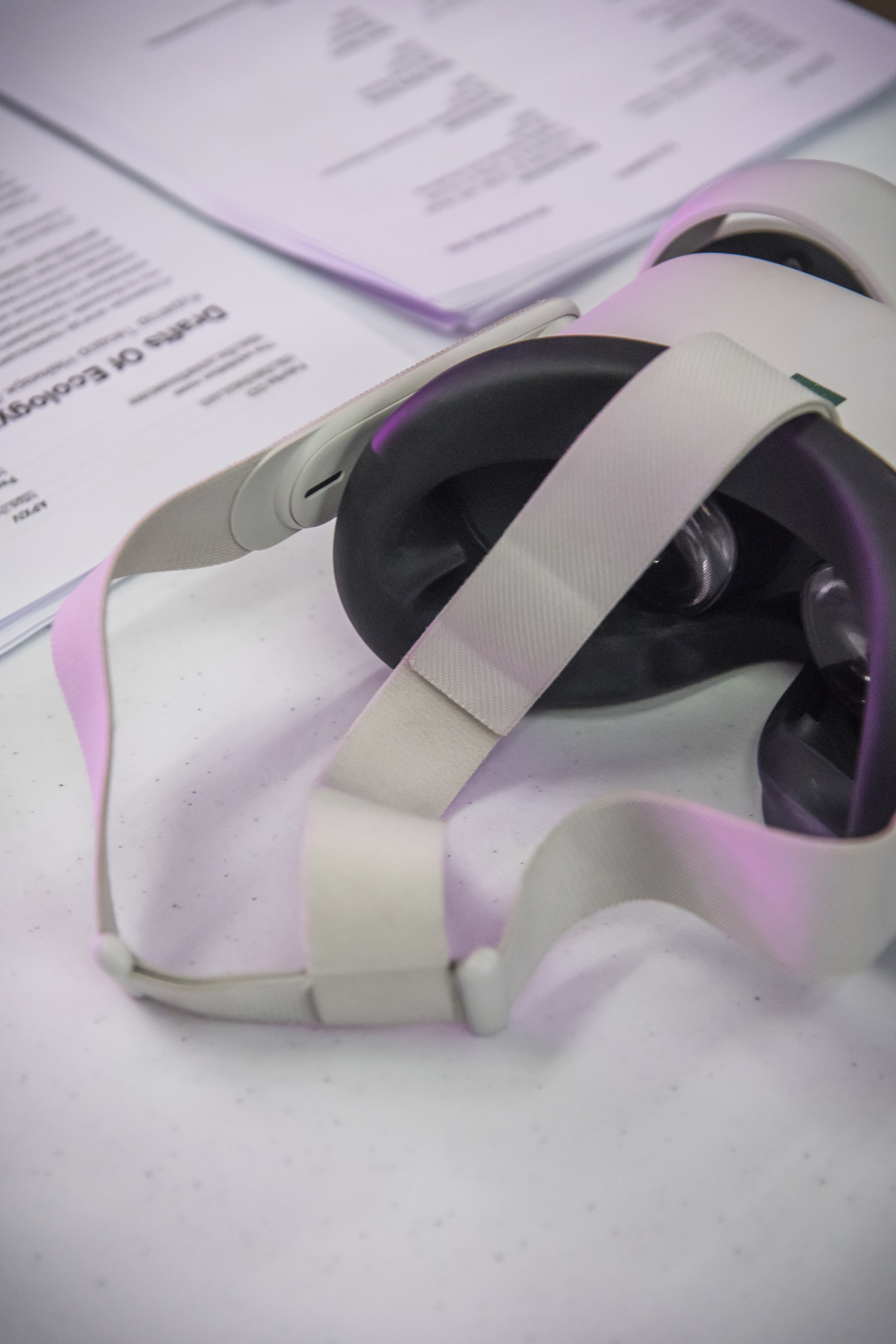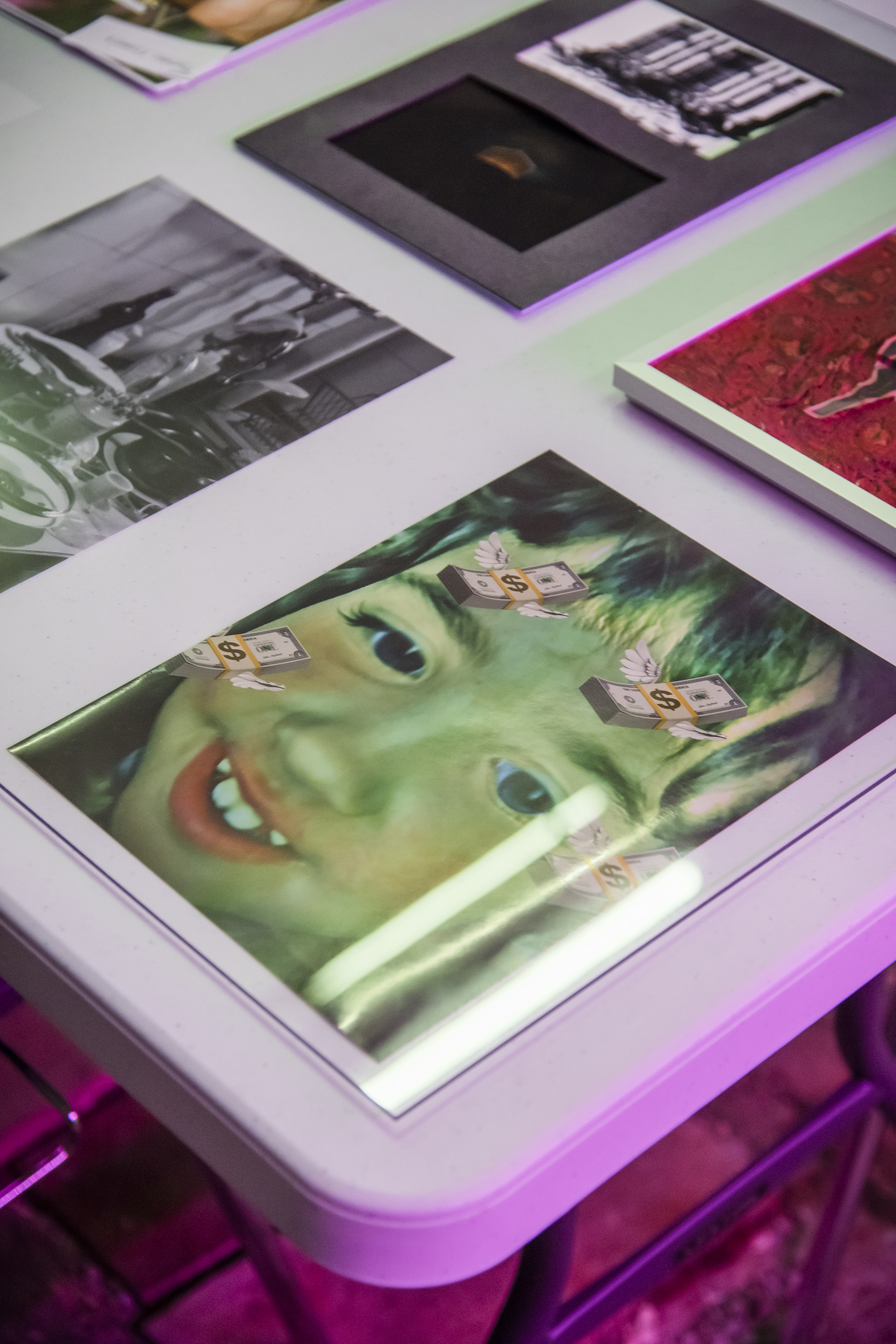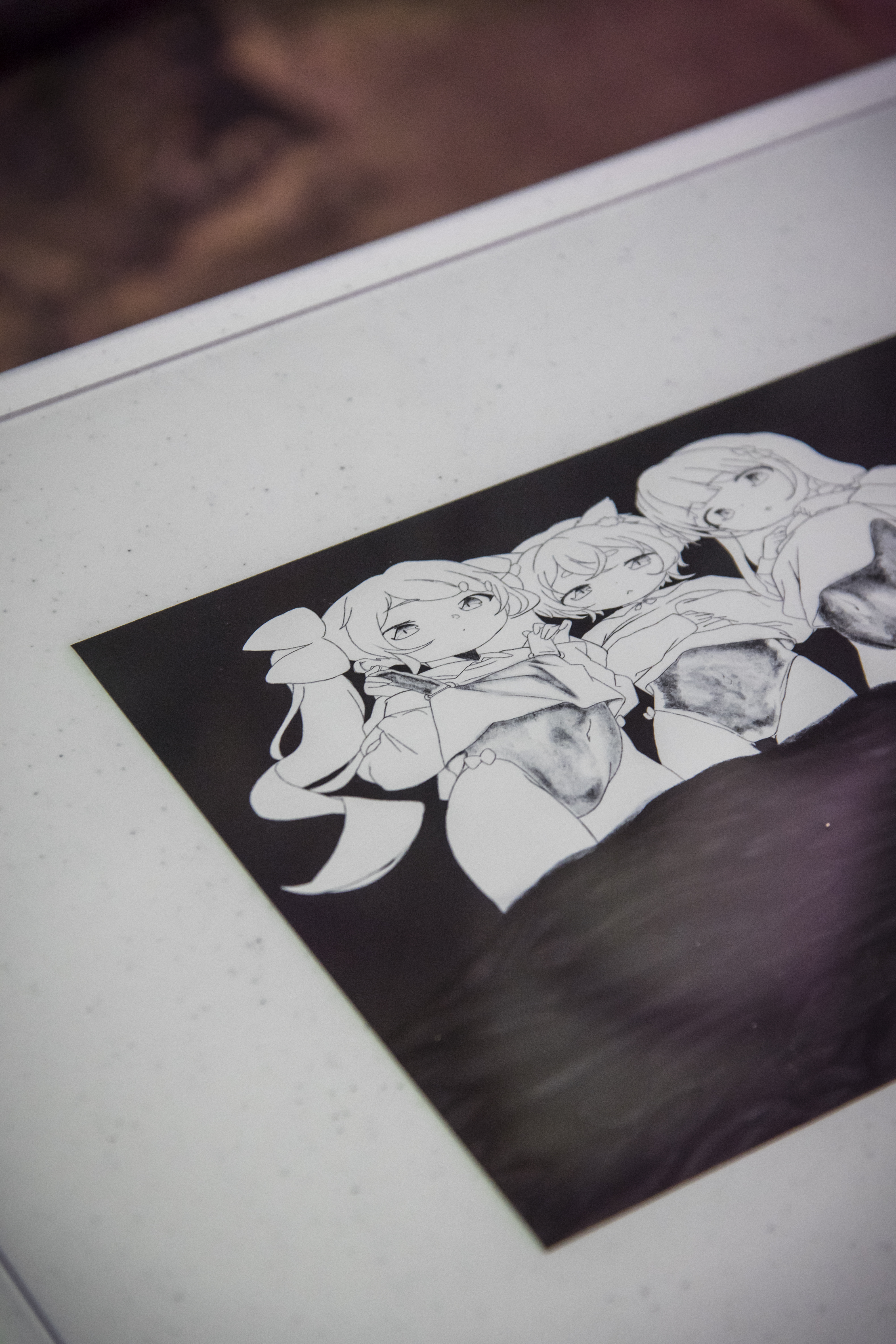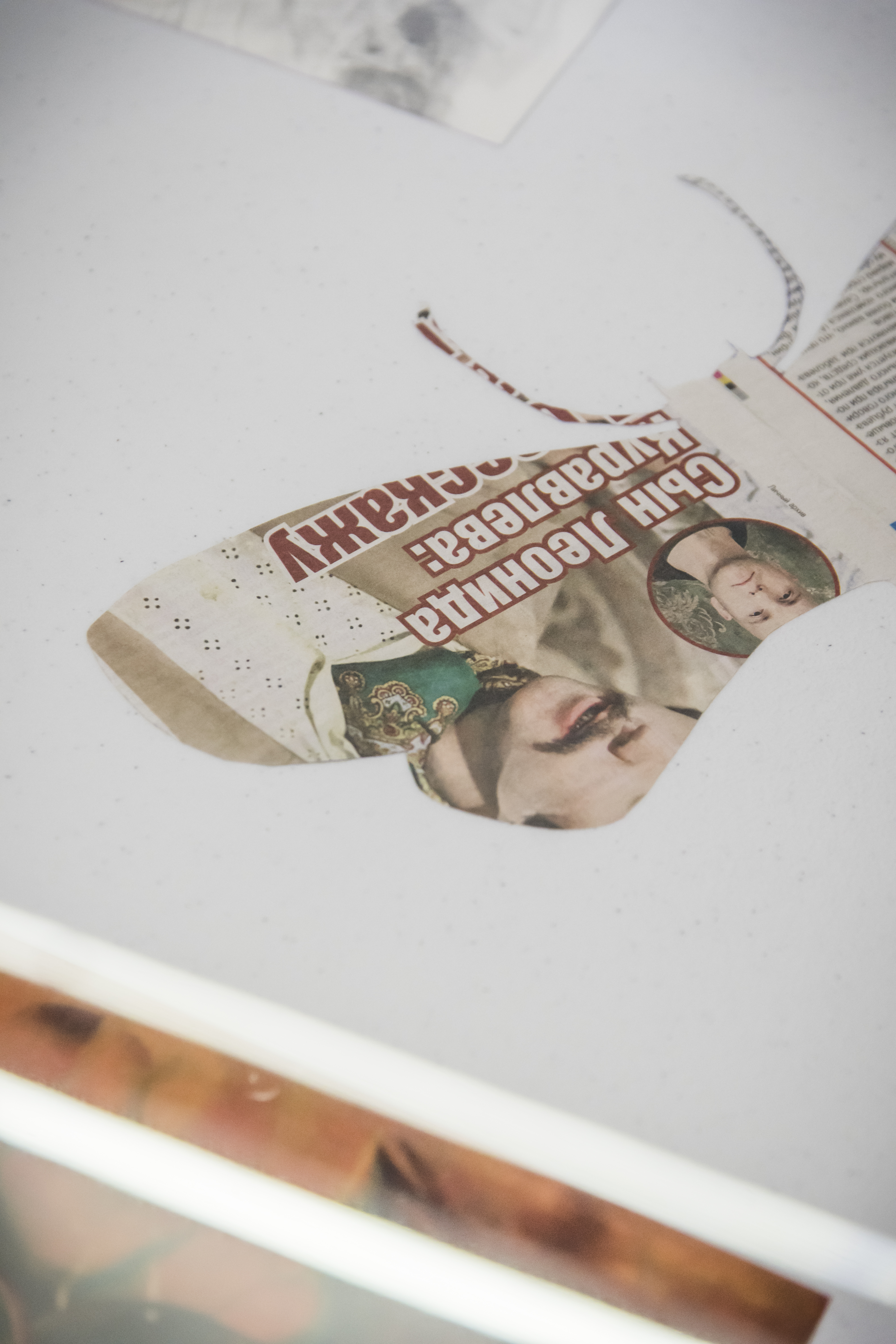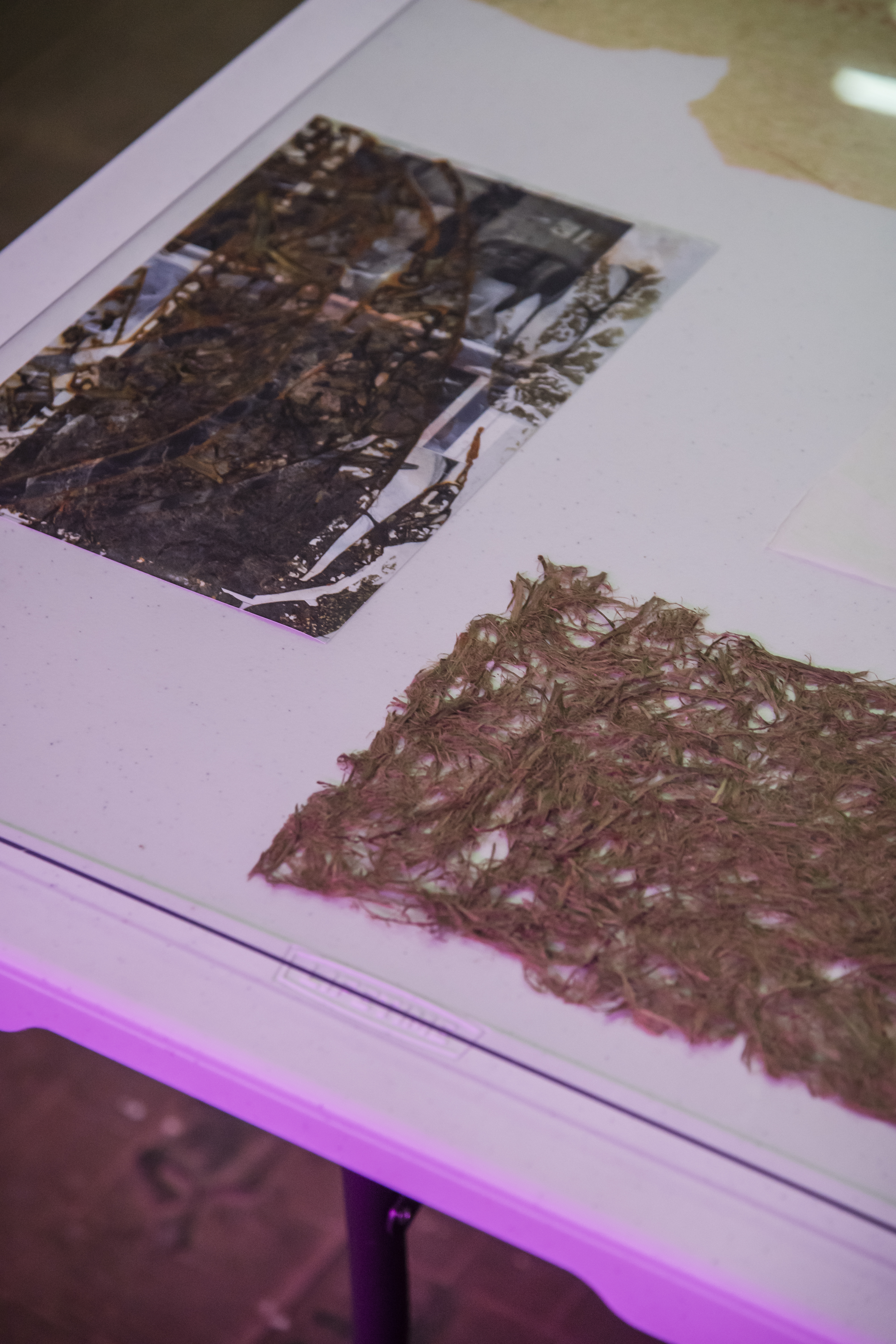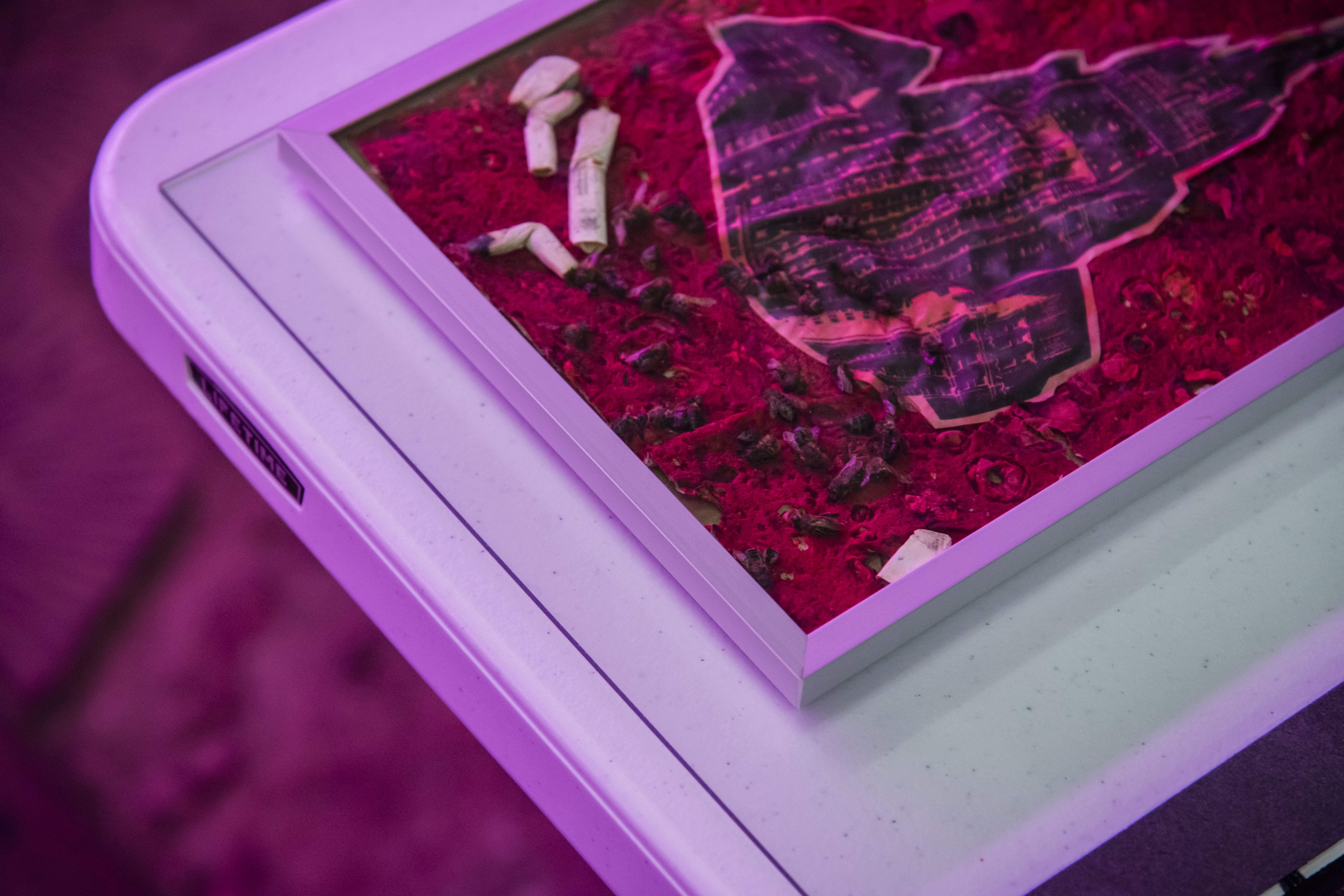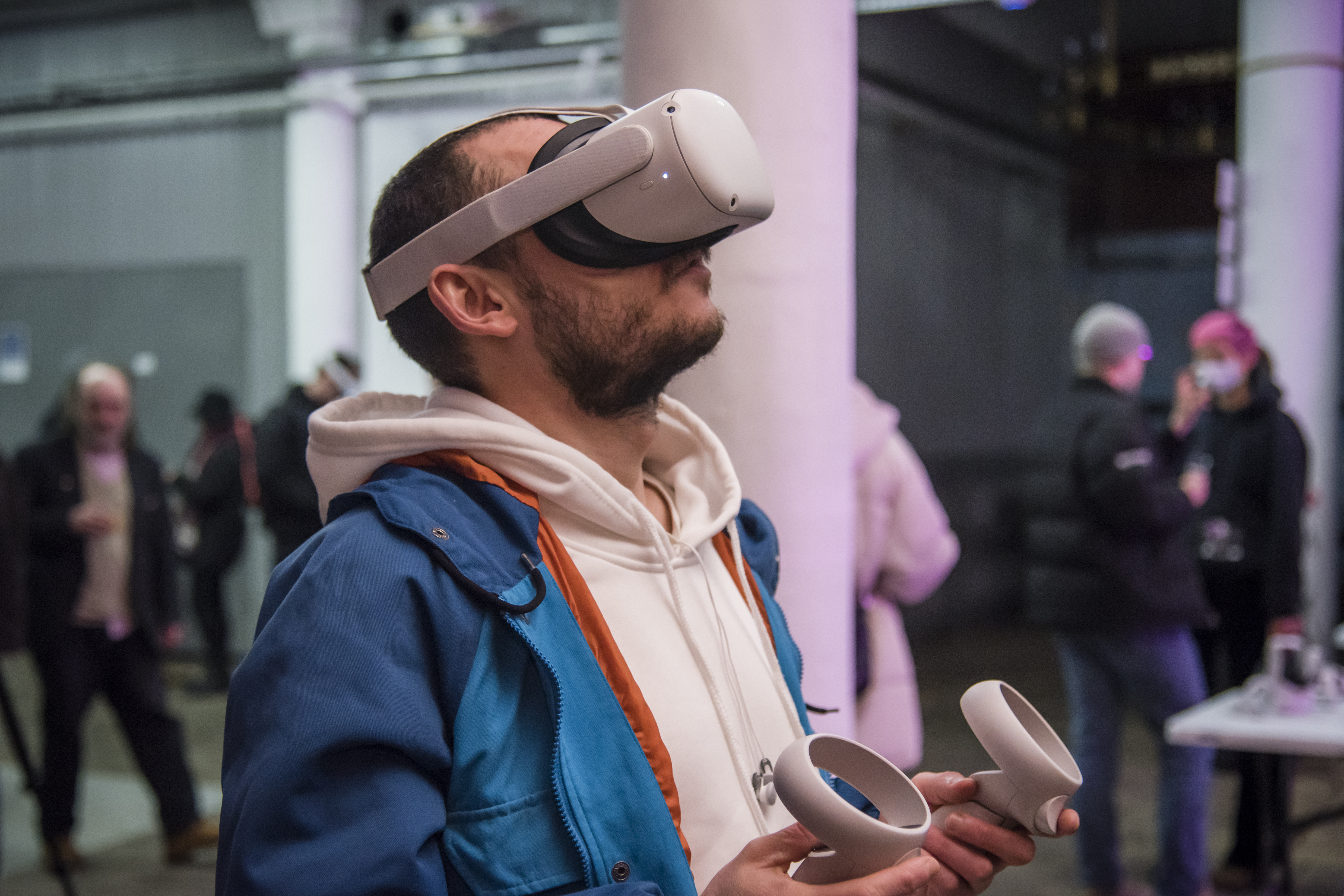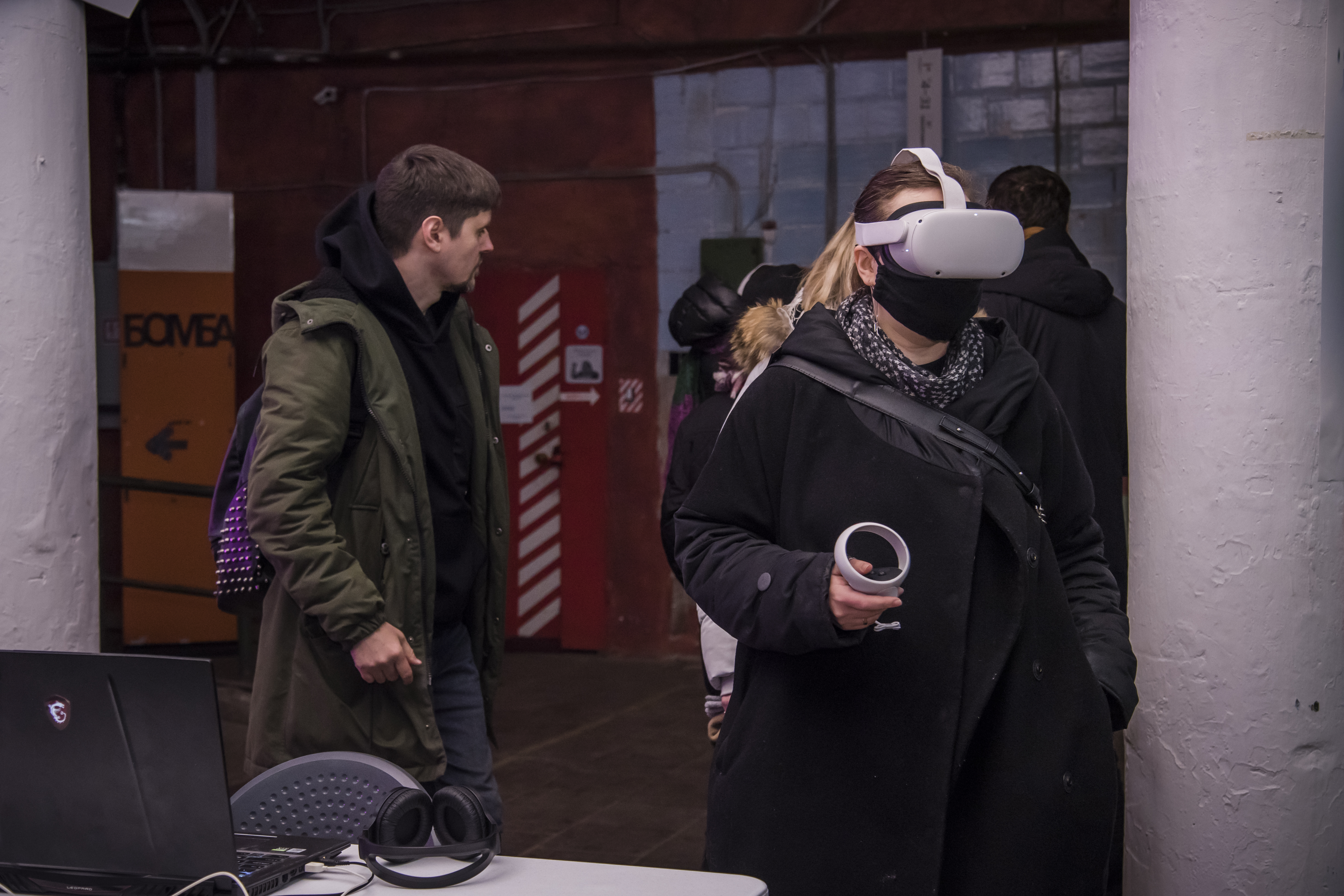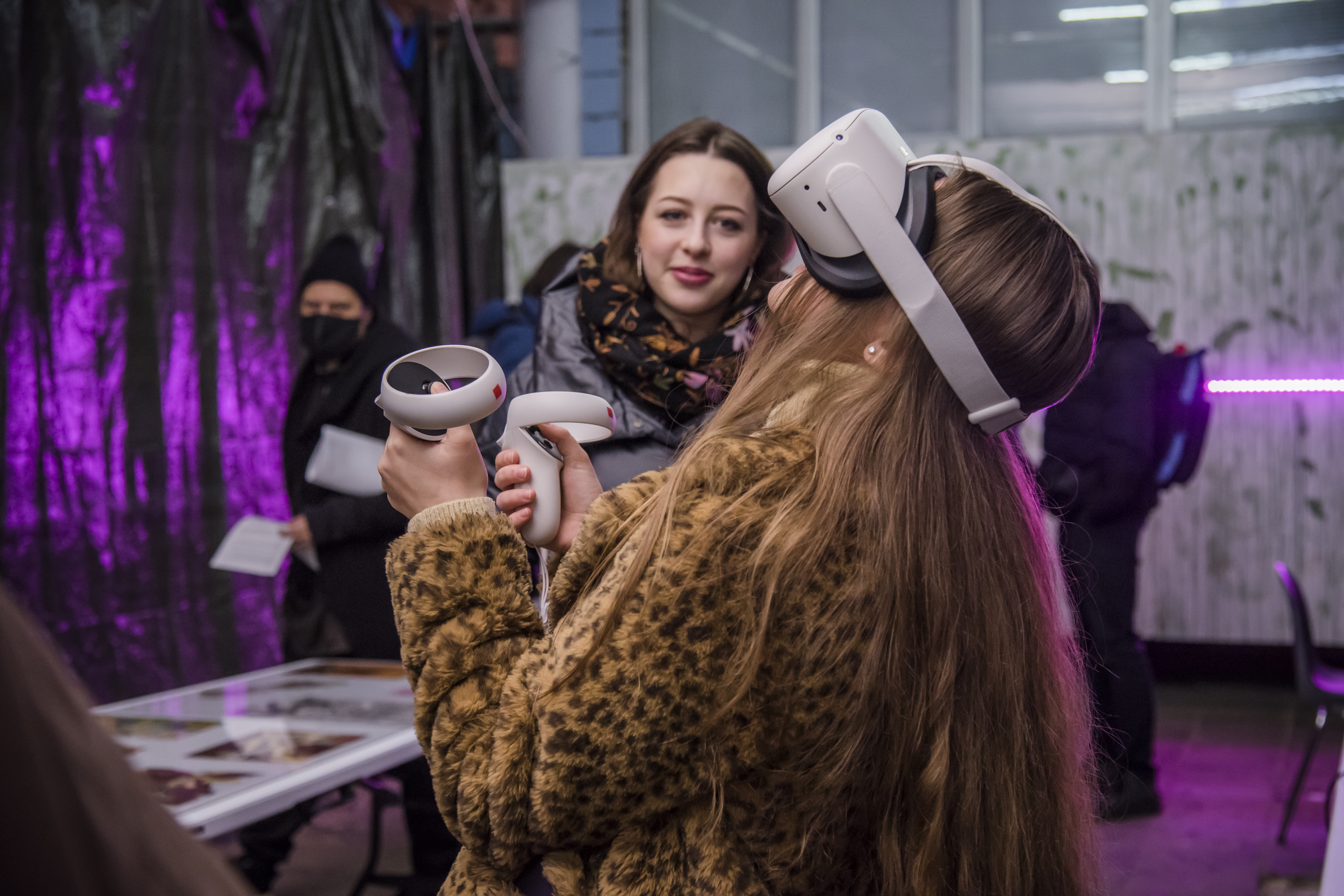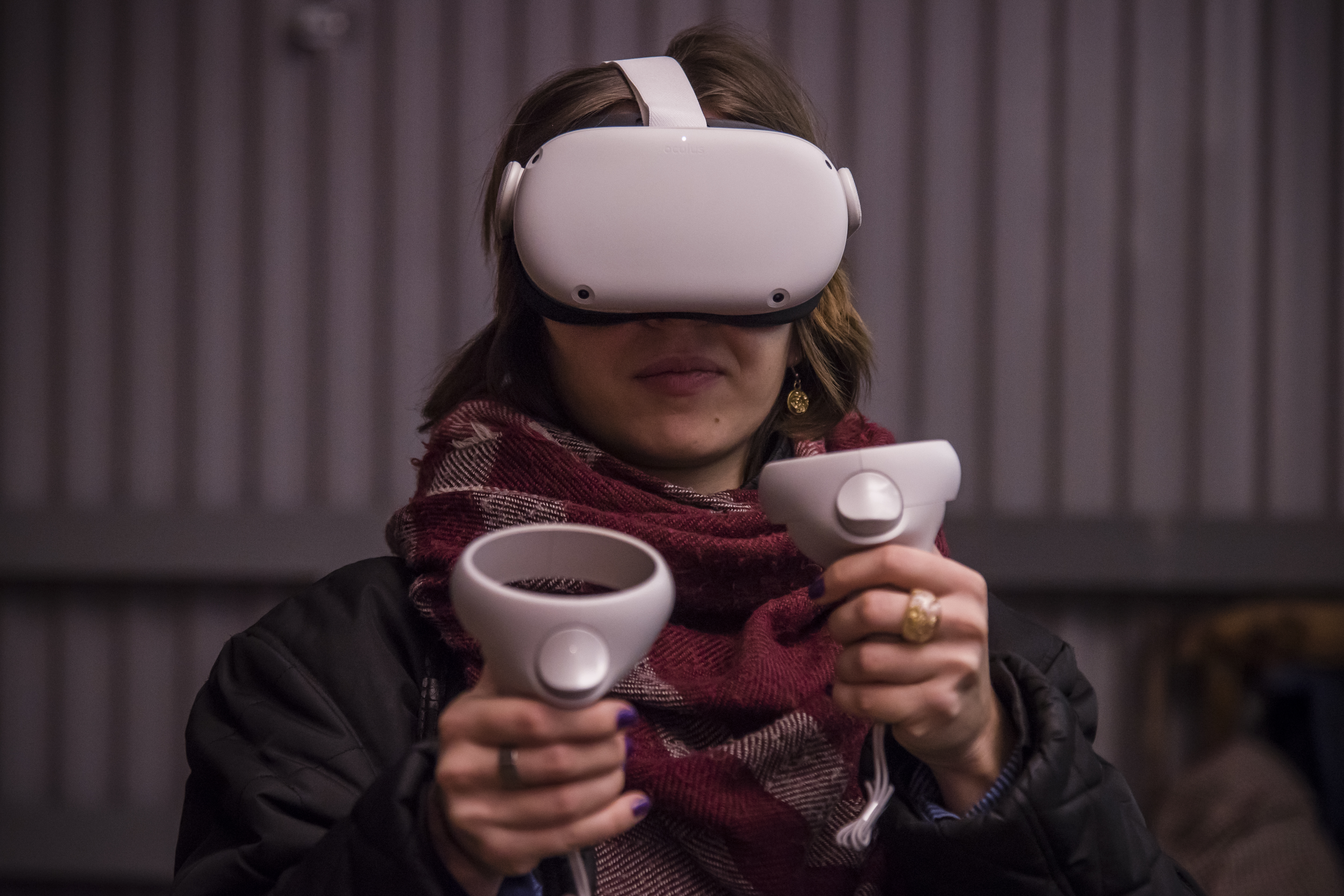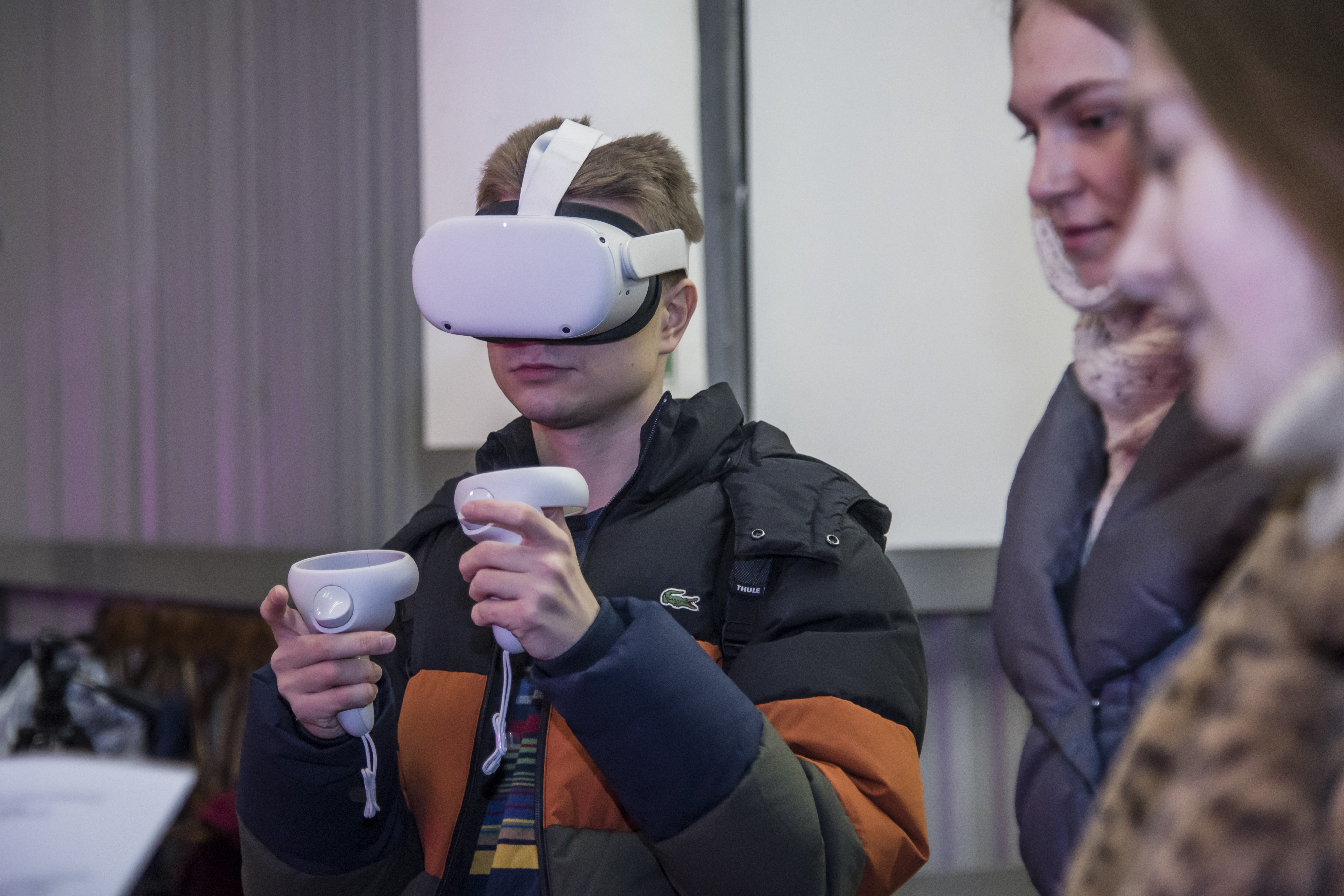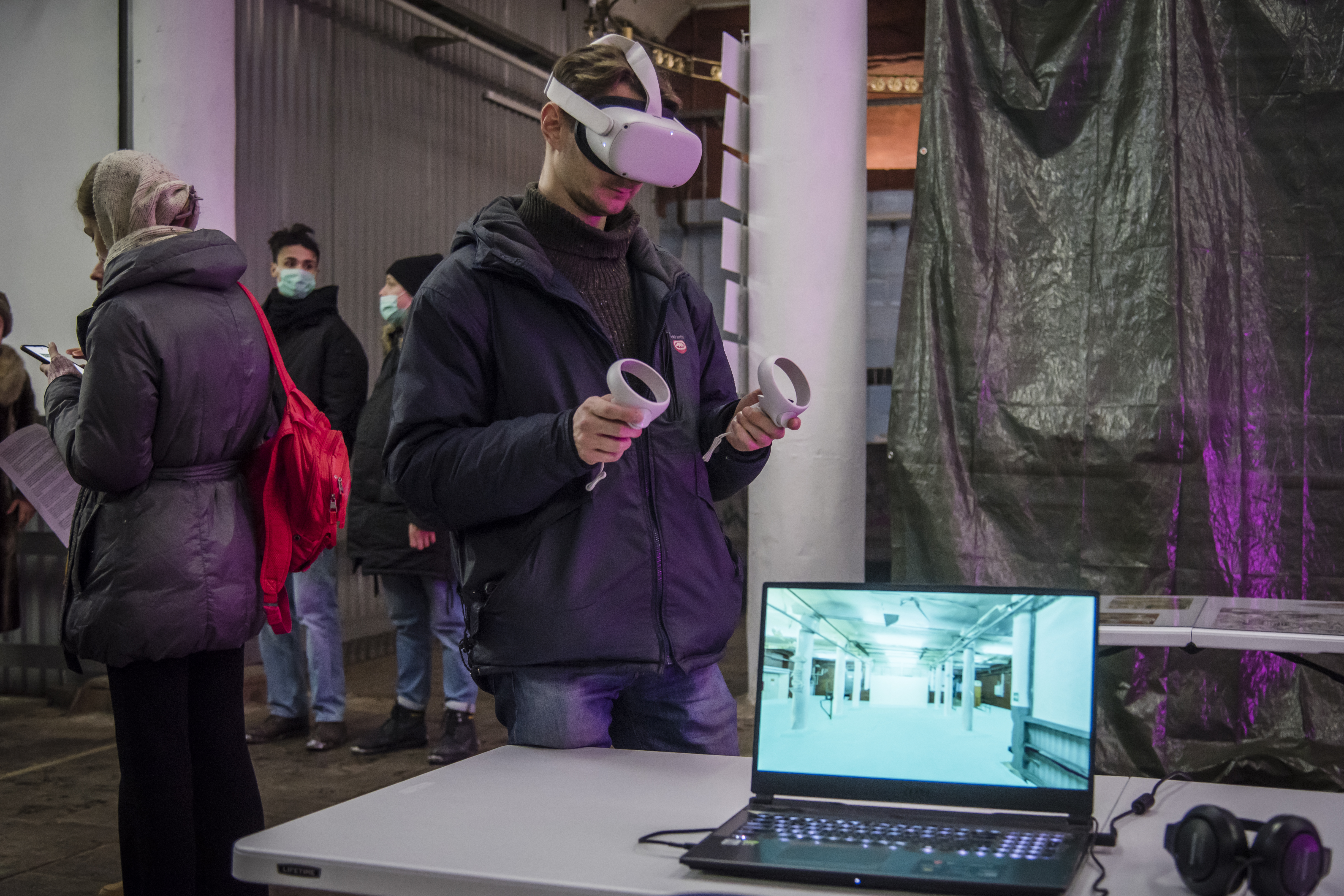Drafts of Ecology:
URD
Curated by Theodor Nymark
VR WORKS
More images via Tzvetnik
@ CCI Fabrika - Moscow, Russia
Opening 28th January 2022
The Weird is always becoming something, decaying from its origin or depicts a tension of opposites which initially generates its continuous motion. The Weird will never be static and will most likely never rest its legs on the kitchen counter. The Weird is never plus or minus, never he or she. The Weird is always revolving. As the leaf from the oak tree, who falls from its branch onto the forest floor and then, devoured by the fungi mycelium only for it to be rearranged back again into the loop, the Weird.
Ecology is Weird.
The curation of Drafts Of Ecology: URD wish to examine the theme - Trend - initiated by APXIV, by exploring the etymological history and its relation to the ecological concept of a loop. The term trend, derives from the Old English trendan - to ‘revolve” or to ‘rotate’. The concept of the loop in ecological terms refers not only to the circular aspect of nature and biology, but likewise to the notion of the weird, or Urd.
“Wyrd is a concept in Anglo-Saxon culture roughly corresponding to fate or personal destiny. The word is ancestral to Modern English weird, which retains its original meaning only dialectically.The cognate term in Old Norse is urðr, with a similar meaning, but also personified as one of the Norns, Urðr (anglicized as Urd) and appearing in the name of the holy well Urðarbrunnr in Norse mythology The Old English term wyrd derives from a Common Germanic term *wurđíz.[1] Wyrd has cognates in Old Saxon wurd,[2] Old High German wurt,[3] Old Norse urðr, Dutch worden (to become), and German werden.
The Proto-Indo-European root is *wert- "to turn, rotate", in Common Germanic *wirþ- with a meaning "to come to pass, to become, to be due" (also in weorþ, the notion of "origin" or "worth" both in the sense of "connotation, price, value" and "affiliation, identity, esteem, honour and dignity).” — Wikipedia
Ecology - a term coined by German zoologist (among other), Ernst Haeckel - is the study of the relationships between living organisms, including humans, and their physical environment.The eco in ecology derives from the Greek oikos, a ”house, dwelling place or habitation”. I intend to deploy the dark ecologist thinking (or thinking of a logic of coexistence - Timothy Morton) in order to comprehend the surrounding environment, not only as biological matter, but likewise as alloy, concrete and minerals…
Tue Greenfort
'Remember Anna Politkovsaya’
Newspaper cut-out.
2022
Morten Knudsen
‘C is of Crisis’
Mixed media on paper.
2020/2021/2022
Amanda Del Valle
‘Motteke! Sailor Fuku!’
Graphite, colored pencil and kneaded eraser on paper.
2022
Amanda Del Valle
‘Motteke! Sailor Fuku!’
Graphite, colored pencil and kneaded eraser on paper.
2022
Amanda Del Valle
‘Motteke! Sailor Fuku!’
Graphite, colored pencil and kneaded eraser on paper.
2022
Emilie Bausager
Soothsayer Herbaria:
1. ’Got butter?’
2. ‘Shepherds clock Thunder’
3. ‘Thunder flowers’
Inkjet on paper.
2022
'Remember Anna Politkovsaya’
Newspaper cut-out.
2022
Morten Knudsen
‘C is of Crisis’
Mixed media on paper.
2020/2021/2022
Amanda Del Valle
‘Motteke! Sailor Fuku!’
Graphite, colored pencil and kneaded eraser on paper.
2022
Amanda Del Valle
‘Motteke! Sailor Fuku!’
Graphite, colored pencil and kneaded eraser on paper.
2022
Amanda Del Valle
‘Motteke! Sailor Fuku!’
Graphite, colored pencil and kneaded eraser on paper.
2022
Emilie Bausager
Soothsayer Herbaria:
1. ’Got butter?’
2. ‘Shepherds clock Thunder’
3. ‘Thunder flowers’
Inkjet on paper.
2022
Kirstine Bjerre
‘Gamers never die they just respawn’
Graphite and water on paper.
2022
Amitai Romm
‘Analyst (test)’
Inkjet print on paper.
2022
Rowda Abdirahman
‘Awake But At What Cost’
Inkjet print on paper.
2021
Sofus Keiding
‘Tiny wired box on a grid, plus last two weeks of movement in numbers’
C-print, inject on hahnemühle, modeling foam.
2022
Melanie Kitti
‘Untitled (pick bones, pick cones, pick stones, pick corazones)’
Acrylic and oil pastel on sandpaper.
2022
Astrid Svangren
‘när havet är blått och svart’
Watercolor on Japanese Silk paper.
2022
‘Gamers never die they just respawn’
Graphite and water on paper.
2022
Amitai Romm
‘Analyst (test)’
Inkjet print on paper.
2022
Rowda Abdirahman
‘Awake But At What Cost’
Inkjet print on paper.
2021
Sofus Keiding
‘Tiny wired box on a grid, plus last two weeks of movement in numbers’
C-print, inject on hahnemühle, modeling foam.
2022
Melanie Kitti
‘Untitled (pick bones, pick cones, pick stones, pick corazones)’
Acrylic and oil pastel on sandpaper.
2022
Astrid Svangren
‘när havet är blått och svart’
Watercolor on Japanese Silk paper.
2022
Thor Kazuo
‘Willow Paper (cut, steamed, beaten, pealed, boiled, pealed, dried, beaten, mixed, dried)’
Willow fiber, corn starch.
2022
Thor Kazuo
‘Steamed’
Print on Paper.
2022
Thor Kazuo
‘Pealed‘
Print on Paper.
2022
Vitaly Bezpavlov
‘Human's Pod (Always CC Round_a) I’
Coca Cola, soaked masking tape on foam board, varnish, cigarette ash.
2022
Rolf Nowotny
‘Fathers Story’
Inkjet on paper.
2022
Rolf Nowotny
‘Hobgoblin’
Inkjet on paper.
2022
Emilie Iman
Øjne for Huacatay’
Oil on canvas.
2022
‘Willow Paper (cut, steamed, beaten, pealed, boiled, pealed, dried, beaten, mixed, dried)’
Willow fiber, corn starch.
2022
Thor Kazuo
‘Steamed’
Print on Paper.
2022
Thor Kazuo
‘Pealed‘
Print on Paper.
2022
Vitaly Bezpavlov
‘Human's Pod (Always CC Round_a) I’
Coca Cola, soaked masking tape on foam board, varnish, cigarette ash.
2022
Rolf Nowotny
‘Fathers Story’
Inkjet on paper.
2022
Rolf Nowotny
‘Hobgoblin’
Inkjet on paper.
2022
Emilie Iman
Øjne for Huacatay’
Oil on canvas.
2022
Claus Haxholm
’T: Circulars (in co/lab with stress indicators) M: loops of circular medias,themes and situations.’
VR and sound work
2022
Frej Volander
‘Contemplation Conquers Interaction’
VR Work
2022
Bing Qing Dong
‘Lily of the Rocks’
VR Work
2022
Gunk Spore
‘Bandicoot’
VR Work
2022
’T: Circulars (in co/lab with stress indicators) M: loops of circular medias,themes and situations.’
VR and sound work
2022
Frej Volander
‘Contemplation Conquers Interaction’
VR Work
2022
Bing Qing Dong
‘Lily of the Rocks’
VR Work
2022
Gunk Spore
‘Bandicoot’
VR Work
2022
Nils Plum
‘Game of Tomorrow Substituting Livestock’
Text
2022
Fafaya Mogensen
‘Trend Piece’
Text
2022
‘Game of Tomorrow Substituting Livestock’
Text
2022
Fafaya Mogensen
‘Trend Piece’
Text
2022
RU:
Drafts Of Ecology: URD
Куратор Теодор Неймарк (Theodor Nymark)
«Странное» всегда превращается во что-то большее, отказываясь от своего изначального происхождения или создавая напряжение между противоположностями, что впоследствие провоцирует его дальнейшее развитие.
«Странное» никогда не будет статичным, недвижимым состоянием.
«Странное» никогда не будет чем-то однозначно положительным или отрицательным. «Странное» – это не «он» и не «она».
«Странное» всегда изменяется. Как лист, упавший с ветки дуба на лесной ковер, а затем покрывшийся мицелием грибов, только для того, чтобы снова включиться в вечную цепочку.
Экология и есть «Странное».
Куратор проекта «Drafts Of Ecology: URD» Теодор Неймарк в проекте осмысляет тему «тренда», предложенную ему группой художников APXIV (Россия). Путем изучения этимологической истории слова и ее связи с экологической концепцией цикличности природы. Термин «тренд» происходит от древнеанглийского «trendan» — «вращаться» или «вращаться». Понятие цикла (loop) в экологических терминах относится не только к круговому аспекту природы и биологии, но и к понятию «странного», или Урд.
«Wyrd» – понятие в англо-саксонской культуре, примерно соответствующее судьбе или личной судьбе. Это слово является предком современного английского weird, которое сохраняет свое первоначальное значение только диалектически.
Куратор Теодор Неймарк (Theodor Nymark)
«Странное» всегда превращается во что-то большее, отказываясь от своего изначального происхождения или создавая напряжение между противоположностями, что впоследствие провоцирует его дальнейшее развитие.
«Странное» никогда не будет статичным, недвижимым состоянием.
«Странное» никогда не будет чем-то однозначно положительным или отрицательным. «Странное» – это не «он» и не «она».
«Странное» всегда изменяется. Как лист, упавший с ветки дуба на лесной ковер, а затем покрывшийся мицелием грибов, только для того, чтобы снова включиться в вечную цепочку.
Экология и есть «Странное».
Куратор проекта «Drafts Of Ecology: URD» Теодор Неймарк в проекте осмысляет тему «тренда», предложенную ему группой художников APXIV (Россия). Путем изучения этимологической истории слова и ее связи с экологической концепцией цикличности природы. Термин «тренд» происходит от древнеанглийского «trendan» — «вращаться» или «вращаться». Понятие цикла (loop) в экологических терминах относится не только к круговому аспекту природы и биологии, но и к понятию «странного», или Урд.
«Wyrd» – понятие в англо-саксонской культуре, примерно соответствующее судьбе или личной судьбе. Это слово является предком современного английского weird, которое сохраняет свое первоначальное значение только диалектически.
Родственный термин в древнескандинавском языке - urðr с аналогичным значением, но также олицетворяемый как одна из норнов, Urðr (англизированный как Urd) и появляющийся в имени святого колодца Urðarbrunnr в скандинавской мифологии.
Древнеанглийский термин wyrd происходит от общегерманского термина * wurđíz. Wyrd имеет родственные слова в древнесаксонском wurd, [2] древневерхненемецком wurt, [3] древнескандинавском urðr, голландском worden (стать) и немецком werden. Протоиндоевропейский корень *wert- «вращаться, вращаться», в общегерманском *wirþ- со значением «случаться, становиться, быть должным» (также в weorþ понятие «происхождение "или "стоит" как в смысле "коннотации, цены, ценности", так и в смысле "принадлежности, идентичности, уважения, чести и достоинства)". — Википедия
Экология — термин, введенный немецким зоологом (среди прочего) Эрнстом Геккелем — это изучение отношений между живыми организмами, включая людей, и их физической средой.
Эко в экологии происходит от греческого ойкос, «дом, жилище или жилище».
Я намерен развернуть мышление темного эколога (или мышление логики сосуществования — Тимоти Мортон), чтобы понять окружающую среду не только как биологическую материю, но и как сплав, бетон и минералы.
Древнеанглийский термин wyrd происходит от общегерманского термина * wurđíz. Wyrd имеет родственные слова в древнесаксонском wurd, [2] древневерхненемецком wurt, [3] древнескандинавском urðr, голландском worden (стать) и немецком werden. Протоиндоевропейский корень *wert- «вращаться, вращаться», в общегерманском *wirþ- со значением «случаться, становиться, быть должным» (также в weorþ понятие «происхождение "или "стоит" как в смысле "коннотации, цены, ценности", так и в смысле "принадлежности, идентичности, уважения, чести и достоинства)". — Википедия
Экология — термин, введенный немецким зоологом (среди прочего) Эрнстом Геккелем — это изучение отношений между живыми организмами, включая людей, и их физической средой.
Эко в экологии происходит от греческого ойкос, «дом, жилище или жилище».
Я намерен развернуть мышление темного эколога (или мышление логики сосуществования — Тимоти Мортон), чтобы понять окружающую среду не только как биологическую материю, но и как сплав, бетон и минералы.
